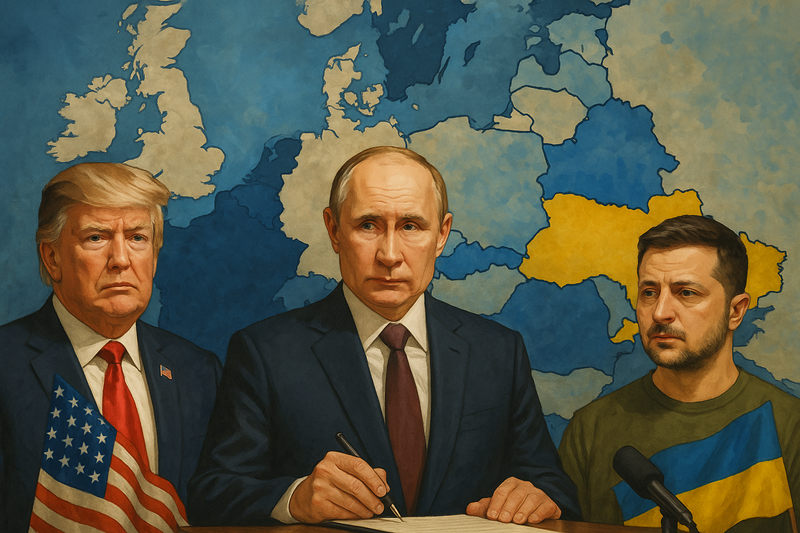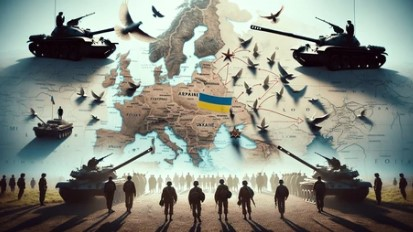Europe's Defense Reckoning: The Urgent Shift Toward Strategic Autonomy
Input
Modified
Europe Faces Defense Reckoning Debate Over Horizon Europe’s Role Toward European Defense Autonomy

For decades, Europe has relied heavily on the transatlantic alliance with the United States to ensure its security, primarily through NATO. However, shifting global dynamics, the return of great power competition, and the re-election of Donald Trump have significantly altered the strategic calculus. As the U.S. grows more inward-looking and unpredictable in its foreign policy posture, the European Union is being forced to reconsider the foundations of its defense strategy. Amid the war in Ukraine, the erosion of trust in American commitment, and the growing threat of Russian aggression, a pressing question has emerged: Can Europe defend itself?
Trump, Putin, and the Collapse of Strategic Certainty
In response, the EU is not only calling for greater national defense investments but is also reevaluating the purpose and structure of its long-term research and innovation efforts. Central to this rethinking is the future of the EU Framework Programme for Research and Innovation—currently Horizon Europe. Originally designed to fund civilian-focused scientific advancement and innovation, Horizon Europe is now at the heart of a contentious debate. Should its funds be redirected to support defense-related research and dual-use technologies? Or should it remain strictly committed to civilian excellence, as originally envisioned?
This article explores how Europe is grappling with these intersecting challenges—strategic autonomy, defense funding, and the future of its Framework Programme—and what it means for the continent's security and sovereignty in a post-American world.
In February 2022, as Russian tanks rolled across Ukraine's borders, the European Union experienced its most profound security shock since the Cold War. The swift and brutal nature of Russia's invasion left little doubt about President Vladimir Putin's broader geopolitical ambitions. For the EU, this was more than a distant war; it was a call to redefine its own security posture.
Josep Borrell, then the EU's foreign policy chief, expressed his disbelief when his staff initially proposed a mere €50 million in aid to Ukraine. "Do you know what a war means? Put three zeros behind!" he retorted. This moment, crystallizing the gravity of the situation, signaled a turning point. From that point forward, Europe began confronting its long-standing dependence on the United States for defense.
Three years later, in 2025, the stakes have escalated further. Former U.S. President Donald Trump, now back in the White House, has rekindled old fears by openly cozying up to Putin and publicly denigrating Ukraine's President Volodymyr Zelenskyy. For many European leaders, this confirms their worst fears: the United States may no longer be a reliable ally.
Trump's actions have not only intensified Europe's existential angst but have also catalyzed a historic reassessment of its defense strategy. No longer can EU leaders take for granted the security umbrella that NATO, led by the U.S., once so robustly provided. In this new era of geopolitical flux, Europe is being compelled to stand on its own military and strategic feet.
The most vocal warnings have come from Central and Eastern Europe, particularly countries like Poland, Estonia, and Lithuania. Having long lived in the shadow of Russian expansionism, these nations have consistently warned that Ukraine might not be Putin's final objective. Their fears are no longer dismissed as alarmist. With incidents of Russian disinformation, sabotage, and even physical attacks on European soil, the continent is beginning to heed these frontline voices.
European Commission President Ursula von der Leyen encapsulated the shift in sentiment when she stated, "Yes, it is about Ukraine – but it is also about us." Her remarks underscore that Europe is not merely a spectator to Ukraine's struggle but a stakeholder in a broader conflict about sovereignty, stability, and the rule of law in Europe itself.
Strategic Gaps, Fiscal Realities, and the Future of the EU Framework Programme
As Europe begins to reckon with the new security environment, the need for a more unified, better-funded defense strategy is becoming clear. A recent report from the Harvard Kennedy School's Belfer Center, co-chaired by former U.S. ambassador to NATO Ivo Daalder, recommends that European nations allocate at least 3% of GDP to defense spending. This is a significant leap from NATO's 2% target — a target still unmet by seven EU nations, including Spain and Italy.
The report outlines several critical areas for investment: improving readiness of combat forces, developing a six-month reserve of ammunition and fuel, and acquiring essential strategic capabilities such as air and missile defense systems. These investments, the report argues, are not optional but necessary for Europe to maintain credible deterrence.
Kajsa Ollongren, former Dutch defense minister and a taskforce member, emphasized the urgency of rethinking defense budgets. "This is a crisis," she said. "We have no choice, and we have to act at the speed of relevance." Her words resonate with a broader European consensus that budgetary constraints can no longer serve as an excuse for inaction.
This urgency has reignited debate around Horizon Europe, the EU's €95 billion research and innovation programme running from 2021 to 2027. Originally established to support scientific excellence, technological development, and societal challenges from a strictly civilian lens, Horizon Europe is now under political pressure to evolve. Proposed amendments to the governing regulation (EU 2021/695) would allow funding for dual-use and defense-related technologies, particularly through the European Innovation Council (EIC) Accelerator.
Critics, including academic organizations like the League of European Research Universities (LERU), argue that such changes could dilute the civilian mission of the Framework Programme. They warn of a slippery slope where the Horizon budget is raided to address political imperatives, potentially undermining the trust between the research community and EU policymakers. They insist that the EU already has the European Defence Fund for military-related initiatives and that Horizon should remain a sanctuary for civilian research.
Nevertheless, the European Commission is moving forward. Von der Leyen has indicated support for “clarifying” the EIC Accelerator’s role in supporting companies with dual-use applications—such as cybersecurity, AI, and drone technologies—especially if such innovations are vital to Europe’s broader security goals.
Meanwhile, conversations are unfolding about the possibility of subsuming Horizon Europe’s successor, Framework Programme 10 (FP10), into a larger European Competitiveness Fund. Such a move has drawn criticism from academic leaders and parliamentarians alike, who argue that this would compromise the autonomy and focus of the EU's premier R&I program. The European Parliament’s Committee on Industry, Research and Energy has called for FP10 to remain a standalone program, emphasizing the need for independent, science-led governance and international collaboration.

Toward a Self-Reliant European Defense
If Europe is to truly defend itself, it must not only fund its armed forces but also resolve the internal contradictions hampering its defense strategy. The symbolic nature of Europe's fragmented response to Ukraine — full of diplomatic unity but logistical shortfalls — reflects the challenge ahead.
Von der Leyen and EU foreign policy chief Kaja Kallas are urging member states to ramp up military aid to Ukraine. A leaked document from Kallas's office calls for at least 1.5 million rounds of ammunition, plus drones, air-defense systems, missiles, and training for Ukrainian brigades. However, Western European diplomats privately concede that Europe would struggle to replace U.S. military aid if it were withdrawn.
President Zelenskyy has acknowledged this blunt reality. "Security guarantees without America are not real security guarantees," he recently told EU leaders. His sentiment lays bare the fragile nature of European defense autonomy.
The sentiment in many European capitals is shifting. Witney predicts that the era of "emptying our shelves" for Ukraine may soon end. Countries are beginning to reconsider whether their own armed forces can afford further depletion. The conversation is pivoting toward preserving European capabilities for European defense.
Daalder believes the best way to keep the U.S. engaged in European security is for Europe to present a credible, detailed plan for self-reliance. Even if Trump or any future U.S. leader turns away, Europe must be prepared to carry on. "You still have to do it," he stressed. "The question is not whether NATO can survive. The question is whether Europe is willing to do what it takes for security to be strengthened and supported by Europeans, for Europeans."
A symbolic reimagining of European defense is already underway. The European Commission's upcoming Defense White Paper, due this spring, is expected to propose structural reforms in procurement, interoperability, and industrial support. EU leaders will meet in June to deliberate on the plan, with potential landmark decisions in sight.
The task ahead is formidable. It will require the kind of political will, public support, and institutional coordination rarely seen in the EU's history. But the alternative — continued reliance on a retreating ally and a passive stance in the face of resurgent authoritarianism — is no longer tenable.
Europe stands at a crossroads. The path forward demands courage, unity, and above all, action. If the continent is to preserve its values, security, and strategic autonomy, the time to act is now.





















